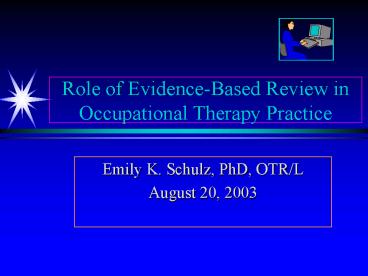Role of EvidenceBased Review in Occupational Therapy Practice - PowerPoint PPT Presentation
1 / 13
Title:
Role of EvidenceBased Review in Occupational Therapy Practice
Description:
Evidence-based medicine is the conscientious, explicit, and judicious use of ... The practice of evidence-based medicine means integrating individual clinical ... – PowerPoint PPT presentation
Number of Views:232
Avg rating:3.0/5.0
Title: Role of EvidenceBased Review in Occupational Therapy Practice
1
Role of Evidence-Based Review in Occupational
Therapy Practice
- Emily K. Schulz, PhD, OTR/L
- August 20, 2003
2
What is Evidence-Based Medicine?
- Evidence-based medicine is the conscientious,
explicit, and judicious use of current best
evidence in making decisions about the care of
individual patients. The practice of
evidence-based medicine means integrating
individual clinical expertise with the best
available external clinical evidence from
systematic research. (Sackett et al, 1996, as
cited in Law, 2002, p. 5)
3
What is Systematic Research?
- Systematic research is rigorous research that has
been conducted in ways that limit bias.
4
What is Research Bias?
- Biases in research involve how the study was
conducted and can include - subject selection
- (How was the sample selected? Did the subjects
appropriately represent the population being
studied?) - measurement
- (Did the assessments tools used accurately
measure what was being studied? Did they have
strong validity and reliability?) - intervention
- (Was the treatment carried out in a way that did
not automatically lead the outcome to prove the
desired hypothesis?)
5
What is Evidence-Based Practice?
- The conscientious use of current best evidence
in making decisions about the care of an
individual or the delivery of health services - (Hellan, 1997, as cited in Law, 2003, handout).
6
Evidence-Based Rehabilitation
- Is a subset of evidence-based medicine/practice
- Evidence-based occupational therapy is a form of
evidence-based rehabilitation - There are 4 important concepts to remember about
Evidence-Based rehabilitation - Awareness, Consultation, Judgment, and Creativity
7
Evidence-Based Rehabilitation - Four Important
Concepts, Part I
- Awareness -
- Having an awareness of the evidence that bears
on clinical practice and the strength of that
evidence (Law, 2002, p.8) - - Therapists must maintain focussed awareness on
the evidence and how it relates to practice - Consultation -
- Use of the best evidence available in
consultation with the patient, to decide upon the
option which suits that patient best (p.9).
(Client centered). - Therapists must be good communicators and educate
their clients on best practice methods available
based upon sound research.
8
Evidence-Based Rehabilitation - Four Important
Concepts, Part II
- Judgment -
- Practitioners must possess good judgment to
differentiate how to apply the recommendations of
evidence-based practice and how they must be
tailored to the specifics of each clients
situation. (p.9). - Therapists must make sound decisions about how to
apply the research evidence to specific client
needs. - Creativity -
- Using the best effort will not always be
straightforward, and practitioners will have to
use their creative skills to meet the challenges
of real life (p. 9). - Therapists must find creative ways to apply the
evidence found in the research to address
specific client needs.
9
Some Reasons to do Evidence-Based Review in
Occupational Therapy Practice
- 1. To discover if the intervention you use with a
particular client/population is the most
effective. - 2. To find the best assessment tools to use to
measure outcomes for a specific program - 3. To determine the cost-effectiveness of a
specific type of intervention.
10
Therapist Attributes Needed to Successfully
Engage in Evidence-Based Review and Apply it in
Occupational Therapy Practice
- 1. Being Flexible - to be able to blend old ways
of thinking and doing with new ways of thinking
and doing - 2. Being a self-directed learner - taking the
initiative to seek out research-based information
to best meet the needs of your clients - 3. Having Humility - maintaining a humble
attitude about your practice and a willingness to
improve on it. - 4. Being a reflective practitioner - Being able
to critically assess your own clinical work and
make changes as needed.
11
Meeting the Expectations of Our Clients-Our
Clients Expect
- 1. We will do science-based interventions
- 2. We will be competent in providing services
- 3. Our interventions will be appropriate and
address their needs and priorities - 4. We will provide effective treatment
- Doing Evidence-Based Reviews allows OTs to be
informed about the best ways to meet the
expectations of their clients.
12
Ways to do Evidence-Based Review
- We will discuss 3 main ways to do evidence-based
review in this class - 1. Meta-analysis
- 2. A systematic literature review
- 3. CATs (Critically Appraised Topics)
13
Questions and Answers
- ?































